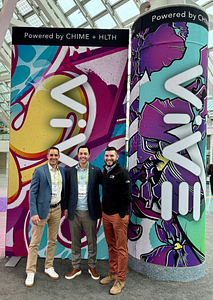The role of the physician is constantly evolving as new
technology, policy, and industry trends impact healthcare delivery. Dr. Pooja
Amarapurkar embraced this constant change and adopted a new perspective that
providers must all adapt to be clinician innovators. We recently sat down with her to understand
what makes her passionate about healthcare, her work in innovation, and her vision
for clinician innovators to drive change moving forward.
About Dr. Pooja AmaraPurKar

Dr. Pooja Amarapurkar, Nephrology
Dr. Pooja Amarapurkar is an Assistant Professor of Medicine in the Division of Renal and Electrolyte Medicine at the University of Pittsburgh School of Medicine and University of Pittsburgh Medical Center (UPMC) in Pittsburgh PA. She is a valuable member of 11TEN's clinician network and has been involved in several partner engagements.
WHAT INSPIRED YOU TO CHOOSE A CAREER PATH IN MEDICINE?
Growing up in India, I was surrounded by incredible physicians
(my parents) who not only provided care to patients, but also worked in public
health to mentor epidemiologists and focused on a larger vision to improve
access to care in India. I grew up being inspired to view healthcare not only
as a means of treating illness, but as an intersection of technology, human
connection, and society. I couldn’t think of a better platform than healthcare
to have a real impact in our world.
WHY IS INNOVATION IN NEPHROLOGY IMPORTANT?
1 in 7 Americans will potentially have kidney disease at
some point in their life and we don’t have enough nephrologists to address the
need. And most cases are caused by an underlying condition such as diabetes or
heart disease. While we need to improve access to care for everyone, we also
need to ensure we can address patients’ individual needs for a more
well-rounded approach. Treating kidney disease goes beyond just scheduling more
appointments with nephrology. Thus, we need innovation to prevent chronic
kidney disease and to integrate healthcare easily into a person’s day to day
life.
CAN YOU SHARE WHAT INNOVATIONS YOU ARE WORKING ON?
Innovation can be as simple as breaking down a barrier to allow a primary care physician and a specialist talk. Triaging patients (using algorithms, EHRs) to ensure that we see the sickest patients first while helping support patients with chronic disease long term may sounds basic and simple, and yet, it’s revolutionary. That’s innovation in our healthcare space.
The Problem: There is typically a long wait list for patients that need to be seen by nephrology. Not everyone on that waiting list needs to wait that long. In early stages of CKD, their care can be managed by a PCP if stable. Meanwhile, there are sicker patients who should not wait so long to see as a nephrologist and need expedited access to care.
The Solution: We decided to implement doctor-to-doctor e-consults using a simple EHR order. Other providers can request an interprofessional consult (which is reimbursable) to assess what they should do for the patient.
Results: We got about 600 e-consults in two years. It made both nephrology and primary care workflows more efficient. Primary care providers were reassured and empowered that they are providing the right care at the early-stage warning signs of CKD. It allowed us to triage sicker patients to get them the care they need more quickly. And it saved patients from navigating parking, waiting areas and paying for a specialist appointment that might not be necessary at their stage of disease.
Seeing how we could use this simple tool to improve our day-to-day workflow access and triage sicker patients was very rewarding. This has been one of my best projects so far. I plan to implement it as much as I can moving forward.
YOU CONSIDER YOURSELF A CLINICIAN INNOVATOR, can you explain what that means?
Being a clinician innovator means to appreciate the existing system and recognize the potential for improvement and getting current with the times. It’s using the clinical experience we get from being ‘boots on the ground’ to innovate in the treatment and health care delivery space. The ability to use technology (e-consults) to bring kidney disease care to the patient’s home has been my opportunity to be a clinician innovator.
What are your guiding principles for anyone interested in healthcare innovation?
Innovation must make healthcare easier, more accessible, and create a best-in-practice service. We need to look to other industries for what makes for a good service offering and learn from them.
- Understand your context: Each health system and practice is unique. To innovate, you need to have a good understanding of the health system to gain buy in, support, and receive the right feedback.
- Leverage technology when it makes sense: It’s time that healthcare catches up to other industries. When we do implement technology, it must streamline workflow and drive efficiency.
- Build for sustainability: If you have identified a gap in care and have a solution to fill it, consider what are the downstream consequences of that change. Healthcare is an ecosystem and changes can have ripple effects.
- Pick the right team: Set yourself up for success by picking a team that you can trust and who you know has the same vision and end goal in mind.
- Treat innovation like a learning process: Don’t be afraid of feedback and changes, learning and implementing feedback will only make your innovation more sustainable. Enact a quality improvement plan to test and learn as you go.
As a clinician innovator, what do you need from the larger industry to support sustainable innovation practices?
To have sustainable innovative practices in healthcare we need support and collaboration from the industry in several aspects such as technology, changes in policy, advocacy and financial support. Having trusted partnerships with companies such as 11TEN and medical practices/universities can bring people from various non-medical and medical fields together to work on a common goal of making healthcare better. When I hear the stories of change from 11TEN and other innovation projects, it makes me realize that we all have a lot more work to do to together for a better future.
Thank you to Dr. Pooja Amarapurkar for taking the time for this interview and acting as an advisor on 11TEN cross-industry innovation projects. At the time of the interview, Dr. Amarapurkar was an Emory Physician practicing at Grady Health System in Atlanta, GA. She is now an assistant professor of medicine in the division of Renal and Electrolyte Medicine at the University of Pittsburgh School of Medicine and University of Pittsburgh Medical Center, Pittsburgh PA.
11TEN offers opportunities for clinicians to provide key informant interviews and champion innovation projects at their health systems. To learn more about how 11TEN partners with clinician innovators, please contact us.


